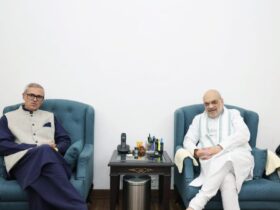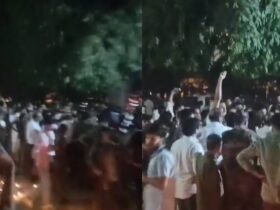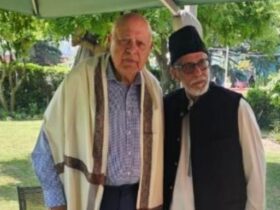The trial of four men accused of murdering former Lebanese PM Rafik Hariri has begun at an unprecedented tribunal at The Hague.
The four – alleged associates of the Syria-backed militant Shia movement Hezbollah – have not been arrested and are being tried in absentia.
Hariri and 22 others were killed by a massive car bomb in Beirut in 2005.
The killings polarised Lebanon and led to the withdrawal of Syrian troops. Hezbollah denies any involvement.
It instead says the assassination was part of an Israeli and US conspiracy.
Shortly before the trial was to start, a suicide bomb blast was reported near a government building in the town of Hermel – a Hezbollah stronghold.
Car bombing in Beirut, Feb 2005The 2005 car bombing of Rafik Hariri led to the withdrawal of Syrian troops
At least four people and the bomber were killed and more than 20 wounded in the attack in the town, which is in the Bekaa Valley, near the northern border with Syria.
Fifth suspect
In his address at the start of the trial, judge David Re said it had been decided that all necessary steps had been taken to try to bring the accused to court.
An explosion hit the north Lebanon town of Hermel as the trial got under way
He said that the court would proceed as if the defendants were present and that, although no pleas had been entered, they would be presumed to have pleaded not guilty and it would be the prosecution’s task to prove guilt beyond all reasonable doubt.
In his opening statement, prosecutor Norman Farrell said the amount of explosives used showed the attackers had intended to send “a terrifying message and to cause panic among the population of Beirut and Lebanon”.
He added: “It is not that the perpetrators simply did not care if they killed their fellow citizens. Rather they intended to do so.”
Hariri’s son, Saad, and other family members are at the trial.
The BBC’s Jim Muir in Beirut says the UN-backed trial is a unique occasion – the first time that a terrorism charge has come before an international court and the first international trials in absentia since the post-World War Two Nuremberg prosecutions.
The bomb attack that killed Hariri and 22 others and wounded 226 more on 14 February 2005 was a seismic event in Lebanese history, fuelling the sectarian divisions between Sunni and Shia Muslims in the country.
Supporters of Hariri, one of Lebanon’s most influential Sunni leaders, blamed Syria for the attack.
There were massive demonstrations against Syrian troops who had been stationed in the country since 1976. They left a few months later.


















Leave a Reply